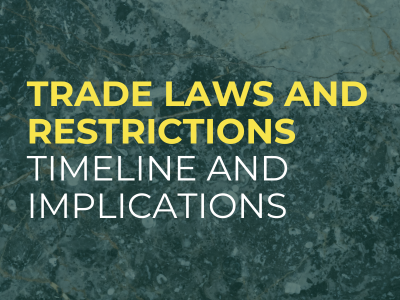
What could the EU omnibus package mean for your business?
The European Commission is currently considering changes to the Corporate Sustainability Reporting Directive (CSRD, 2023), the Corporate Sustainability Due Diligence Directive (CSDDD, 2024) and the EU Taxonomy (2020) in an omnibus package of changes due to be published on 26 February 2025. The Commission has committed to reduce reporting requirements on companies, and is now consulting with key stakeholders in closed door roundtable discussions. The changes reflect key political and economic dynamics at play in the sustainability sector that the TDi Sustainability has been observing keenly.
According to recent reports, the potential omnibus package may go beyond streamlining reporting inefficiencies and end up significantly watering down the sustainability requirements. Among the potential changes, early reports have suggested that double materiality may be removed from the CSRD in favour of single (financial) materiality, and the CSDDD’s current requirements for climate transition plans and liabilities will be reconsidered. If these changes come to pass, the European Sustainability Reporting Standards may need to be modified. It is possible that up to 85% of companies will no longer be in scope of the CSDDD.
The majority of European companies that would be in scope of these regulations are headquartered in Germany, but Berlin lawmakers missed the late 2024 deadline to transpose the CSRD. Candidates in Germany’s 23 February elections have made reducing bureaucracy a key talking point on the campaign trail, hoping to breathe new life into the stagnating German economy. Perspectives of industry representatives on the omnibus measures in other European states have varied.
At the same time, policymakers in Brussels have doubled down on increasing European competitiveness in key strategic sectors, particularly in light of the recent Draghi Report (The future of European competitiveness – A competitiveness strategy for Europe) that highlighted pitfalls to future of European economic growth. Increased global tensions – and the Trump Administration’s rejection of ESG considerations and climate action – have also contributed to concerns that extensive sustainability reporting requirements impede productivity in Europe.
Meeting the expectations of the CSRD and CSDDD certainly requires effort from companies, as the TDi team has experienced while supporting clients across Europe to meet these obligations. However, working across commodities and geographies for more than 10 years, TDi has consistently seen how supply chain due diligence and the integration of sustainability thinking into business makes companies more resilient and competitive by enabling them to understand their exposure to sourcing risk. Whatever the outcomes of omnibus debates, in order to plan for the future, companies need proactively understand and mitigate supply chain risks – the approach at the heart of the EU’s sustainability regulations.
Ensuring readiness for the EU omnibus changes will also ensure your company is well prepared for other emerging sustainability regulations and disclosure requirements, and potentially improve corporate reputation and access to capital as stakeholders place ever-increasing emphasis on sustainability credentials. Get in touch to discuss what the omnibus changes could mean for your business and to find out how TDi can help you prepare for the CSRD and CSDDD.
The European Commission is currently considering changes to the Corporate Sustainability Reporting Directive (CSRD, 2023), the Corporate Sustainability Due Diligence Directive (CSDDD, 2024) and the EU Taxonomy (2020) in an omnibus package of changes due to be published on 26 February 2025. The Commission has committed to reduce reporting requirements on companies, and is now consulting with key stakeholders in closed door roundtable discussions. The changes reflect key political and economic dynamics at play in the sustainability sector that the TDi Sustainability has been observing keenly.
According to recent reports, the potential omnibus package may go beyond streamlining reporting inefficiencies and end up significantly watering down the sustainability requirements. Among the potential changes, early reports have suggested that double materiality may be removed from the CSRD in favour of single (financial) materiality, and the CSDDD’s current requirements for climate transition plans and liabilities will be reconsidered. If these changes come to pass, the European Sustainability Reporting Standards may need to be modified. It is possible that up to 85% of companies will no longer be in scope of the CSDDD.
The majority of European companies that would be in scope of these regulations are headquartered in Germany, but Berlin lawmakers missed the late 2024 deadline to transpose the CSRD. Candidates in Germany’s 23 February elections have made reducing bureaucracy a key talking point on the campaign trail, hoping to breathe new life into the stagnating German economy. Perspectives of industry representatives in other European states on the potential omnibus measures have varied.
At the same time, policymakers in Brussels have doubled down on increasing European competitiveness in key strategic sectors, particularly in light of the recent Draghi Report (The future of European competitiveness – A competitiveness strategy for Europe) that highlighted pitfalls to future European economic growth. Increased global tensions – and the Trump Administration’s rejection of ESG considerations and climate action – have also contributed to concerns that extensive sustainability reporting requirements impede productivity in Europe.
Meeting the expectations of the CSRD and CSDDD certainly requires effort from companies, as the TDi team has experienced while supporting clients across Europe to meet these obligations. However, working across commodities and geographies for over 10 years, TDi has consistently seen how supply chain due diligence and the integration of sustainability thinking into business makes companies more resilient and competitive by enabling companies to understand their exposure to sourcing risk. Whatever the outcomes of omnibus debates, in order to plan for the future companies need proactively understand and mitigate supply chain risks – the approach at the heart of the EU’s sustainability regulations.
Ensuring readiness for the EU omnibus changes will also ensure your company is well prepared for other emerging sustainability regulations and disclosure requirements, help you better understand supply chain risks and potentially improve corporate reputation and access to capital as stakeholders place ever-increasing emphasis on sustainability credentials. Get in touch to discuss what the omnibus changes could mean for your business and to find out how TDi can help you prepare for the CSRD and CSDDD.



